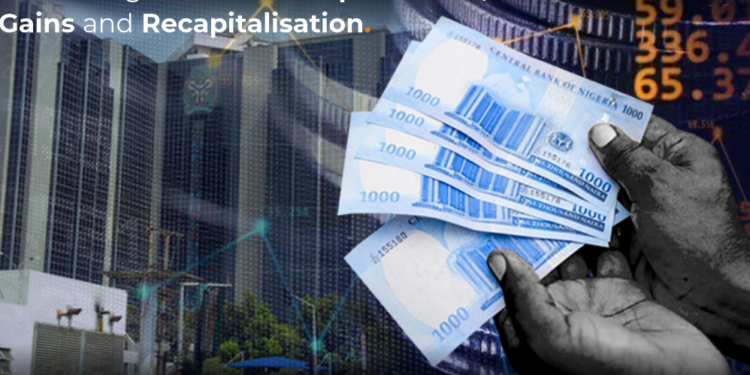The recapitalization frenzy is in full swing, with the front-runner banks—Access, GTB, and Fidelity—already off the mark, while FCMB looks to join the race soon.
For me, this regulatory-driven recapitalization comes with mixed feelings.
I’ve been wanting to comment on the exercise but have stayed away simply because I really do not have access to the kind of information that would allow me to make an informed decision.
But off the top of my head, I would expect that while the policy itself remains critical for the continued robustness of the sector, one cannot help but ask from which market these banks are hoping to raise these humongous sums.
Savings are dipping, the cost of living skyrocketing, businesses outside their sector recording massive losses, local and international debt escalating, nationwide ratings fluctuating, and FDIs tepid with FPIs unsure of what they really want—coming and going in unsure steps.
But the banks have never been known to be cowardly. If for anything, the way they approach their business with military precision is simply the main reason they seem to have built a bulwark against the ravaging effects of an unfettered economy.
Already, these three banks have jumped into the fray, announcing very ambitious public offers, with Access Bank showing the boldness that has made it the darling of the markets.
Instead of opting for a public offer, Access Bank chose Rights, asking existing shareholders to buy more. This move shows the level of confidence in their value proposition and their strong belief in the benefits they have delivered to their shareholders over the years and its resultant effects on their decision to buy.
The smooth transition after Herbert’s sad passing and the infusion of highly respectable leadership, along with the immediate announcement of historic performance, have all contributed to making Access’ Rights issue a darling to its shareholders.
Fidelity Bank, so far, has been a brilliant prospect. Relatively smaller in both size and offering proposition, its value proposition is huge, offering great growth margins for investors.
With a relatively young management team, strong strategic intent, and a vision that spans markets, I’m not hesitating to endorse their offer.
For GTB, I’ll just calm down a bit. Their pricing is stirring discussions among market watchers, making one wonder if it was clearly thought out.
Another concern is the seeming key man risk that tends not to give it the cascading spread in collective decision-making. This may be a slight concern for me, but overall, it remains a strong buy option, especially with its historic record of value creation for its shareholders and a strong appetite for future performances.
But in all of these discussions is the Temi Popoola-led NGX’s incursion into the primary market with its novel NGX Invest platform.
Historically, the NGX, apart from its Facts Behind the Figures program and limited research support for public offers, usually just stands aside and watches as other market players struggle, later reaping the benefits through listing and subsequent secondary market trades.
But this time, they have jumped into the fray by launching their platform, which has been designed to further ease public participation in this very important exercise.
I was recently invited to a select session with media personalities to review the platform.
During the session, the articulate Temi Popoola, who has been driving innovation at the NGX, carefully took us through the particulars of the platform.
NGX Invest is the latest in a series of technology-driven initiatives we are witnessing from this reformist leadership at the NGX.
According to him, the platform has a sleek, user-friendly interface that simplifies market offerings while modernizing equity issuance and democratizing opportunities for a wider range of investors.
In layman’s terms, this means that at the touch of a finger, one can access these offers, receive accurate and unbiased research information on the offers, putting them in a strong position to make better decisions, and finally offering an efficient and seamless buying process.
The platform is so well-configured that it’s no wonder that issuers have already linked up with its API in their recapitalization efforts, efficiently connecting with retail investors.
This is a far cry from what we were used to when physical forms had to be filled out, collated manually, and submitted to registrars who also processed them manually, often causing headaches and confusion.
The NGX and its board, led by my big brother and friend Alh Kwairanga, have clearly demonstrated their willingness to be fluid and technology-savvy. In my mind’s eye, this has restored confidence in their bourse, which is why you see these banks coming to them to issue and reissue shares, among other things.
The SEC has also done well in approving this, and I hope this marks the beginning of a turnaround in their approach to their duties.
Finally, let me say that I am very confident that this exercise will be successful. My confidence does not stem from any macro market drive, as mentioned earlier, because I do not see where or how the already harried retail market will find these kinds of funds in these times of economic strangulation. But my optimism is based on the banks’ historical performance matrix, which has always seen them cross the tapes brilliantly.
How they plan to do that is none of my concern, as long as they succeed in achieving the CBN’s goal of strengthening the space and providing us with robust and virile institutions.
As for the NGX, we will say well done on this initiative. This is the NGX of our dreams—an institution that understands market trends and aligns perfectly with them.
Strong buy recommendations for Access and Fidelity. GTB, use your own sense, and when FCMB comes out, we will evaluate.
Do something and don’t just sit on the fence. Join the party.









